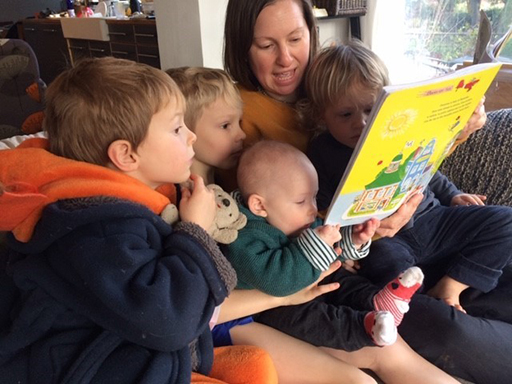7 Parents’ understanding of what counts as reading
In working to enrich the partnership between teachers, children and parents, you will want to understand more about parents’ attitudes and beliefs about reading, as these influence their children’s experience and identities as readers. Some parents, like some teachers, may see reading as an optional hobby and may not yet appreciate the considerable impact of regular choice-led reading on children’s futures. To help parents come to value choice-led reading both in their own lives and that of their children, they will benefit from opportunities to experience the pleasure of being read to themselves from children’s books. This could happen in a parents’ evening for instance, to remind them of the engaging power of children’s literature and the sense of togetherness that is built through hearing stories. Parents will also benefit from knowing more about the positive impact of choosing to read regularly and widely on their child’s cognitive, social and emotional development.

Research indicates that homes influence children’s reading frequency and enjoyment, both ‘actively’ through parent–child book reading and library visiting, and ‘passively’ through parental beliefs about the importance of reading and the provision of reading-related materials (Wiescholek et al., 2018). Siblings can also be important reading role models by sharing reading material; talking about texts; reading aloud and so forth (Knoester and Plikuhn, 2016).
In Session 4, we highlighted that adults who know children’s interests and preferences are better able to help them find texts that interest them, satisfy their curiosity and are intrinsically satisfying. Involving parents in reflecting on what counts as reading in their own lives and those of their children is also valuable. You could try one of the strategies listed below. Open the links given in a new tab by holding down Ctrl (or Cmd on a Mac) when you select it. You can then bookmark them to come back to at a later time.
- You might invite parents to go on a ‘reading hunt’ with you and the class in the local community to take photos of the wide range of texts available and make a montage. Walking with parents and creating the display can help everyone register, recognise and value the rich diversity in children’s reading lives.
- The ‘Summer Reading Adventure’ [Tip: hold Ctrl and click a link to open it in a new tab. (Hide tip)] involves ticking off the range of texts that children encounter on the Adventure Map across a weekend or summer holiday. In reading multiple high street shop signs, bus timetables, adverts and park notices, for example, parents may well appreciate that much of this reading will be in the form of a short ‘dip’ but may still be interesting and enjoyable for their child.
- The ‘Reading Treasure Hunt’ can be used on or offline and involves children hunting for reading materials such as advertising, messages, takeaway menus, comics, reading that makes you laugh or is precious to you and much more. During the Covid-19 lockdown in 2020, the Treasure Hunt board proved popular as a tool for classes to connect around reading and it consistently received positive feedback from parents. Many reported coming to appreciate a wider range of reading and a more open partnership stance developed in some schools about reading in the real world.
